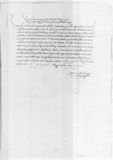List #5507
Sigismund I Jagiellon do Ioannes DANTISCUSVilnius, 1536-08-25
| odebrano [1536]-09-08 Rękopiśmienne podstawy źródłowe:
Publikacje:
| ||||||
Tekst + aparat krytyczny + komentarzZwykły tekstTekst + komentarzTekst + aparat krytyczny
Reverendo in Christo Patri et Domino
Reverende in Christo Pater, sincere nobis dilecte.
Indiximus
Hortamur
S(inceritatem) or S(trenuitatem)⌈S(inceritatem)S(inceritatem) or S(trenuitatem)⌉
Tuam et mandamus, ut istis bene peractis ac determinatis tempestive etiam ad
Quae bene valeat.
Ad mandatum


 AGAD, AZ, 2999, f. 149v
AGAD, AZ, 2999, f. 149v